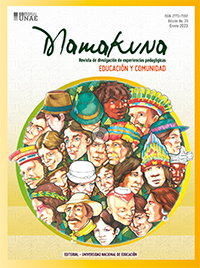Virtual Interactive Play Club: A Magical World Between Parents and Children
DOI:
https://doi.org/10.70141/mamakuna.20.783Keywords:
pandemic, initial education, cerebral palsy, Zoom meetings parents-child, leisure activities clubAbstract
At the beginning of the COVID-19 pandemic, Fundación Centro San Juan de Jerusalén (FCSJJ), specialized in comprehensive care of children and adolescents aged 0-18, with neurodevelopmental disorders, sought alternatives, for its Pedagogy area to maintain contact with children from 2 to 6 years old, proposing virtual playful activities. FCSJJ educators created a virtual space on Zoom and Facebook Live, named Club San Juan, and thus they transformed pandemic adversity into an educational opportunity. The objective of this action research was to explore socio-educational practices to promote learning among educators, children, and their families. The methodology used in this research was exploratory and inductive.
Downloads
References
AFS Intercultural Programs. (2014). Ciclo de Aprendizaje Experiencial de Kolb. AFS Intercultural Programs. https://d22dvihj4pfop3.cloudfront.net/wp-content/uploads/sites/27/2019/02/13111417/Kolb_sExperientialLearningCycleforAFS_Friends_ESP.pdf
Aguirre, E. y Yupa, B. (2020). Percepción de la educación virtual durante la COVID-19 en los colegios del distrito Metropolitano de Quito, Ecuador, 2019-2020. Revista del Grupo de Investigación En Comunidad y Salud GICOS,5(2), 63-76. http://erevistas.saber.ula.ve/index.php/gicos/article/view/16619/21921927763
Centro Comunitario de Aprendizaje [CCA]. (2000). Modelo de David Kolb, aprendizaje basado en experiencias. CCA. http://www.cca.org.mx/profesores/cursos/cep21/modulo_2/modelo_kolb.htm
Fundación Argentina María Montessori [FAMM]. (2022). El método Montessori. FAMM. https://www.fundacionmontessori.org/sobre-montessori/el-metodo/
Freire, P. (2004). Pedagogía de la autonomía. Saberes necesarios para la práctica educativa. Paz e Terra SA.
Guerrero Hernández, J.A. (2020, enero 26). Los 9 principios básicos del método Montessori. Blog Docentes al día. https://docentesaldia.com/2020/01/26/los-9-principios-basicos-del-metodo-montessori/
Kolb, D. A. (1984). Experiential Learning : Experience as the Source of Learning and Development. Prentice Hall.
Martínez, E. y Sánchez, S. ( 2020, diciembre). Figuras de la pedagogía. María Montessori: La pedagogía de la responsabilidad y la autoformación. Portal de la educomunicación. https://educomunicacion.es/figuraspedagogia/0_montessori.htm
Ministerio de Educación (2014). Currículo Educación Inicial 2014. Ministerio de Educación. https://educacion.gob.ec/wp-content/uploads/downloads/2014/06/curriculo-educacion-inicial-lowres.pdf
Miranda, C. (2004). El arcoíris que perdió un color. Libresa.
Thomas, V. y Korky, P. (2013). La bruja Winnie. Océano Travesía.
Torres A. (2016). La Teoría del Aprendizaje Significativo de David Ausubel. Psicología y mente. Psicología y Mente. https://psicologiaymente.com/desarrollo/aprendizaje-significativo-david-ausubel
Vygotsky, L. (1979). El desarrollo de los procesos psicológicos superiores. Editorial Gijalbo.
UDLA. (2020). Actividades para niños en periodo de cuarentena. UDLA. https://www.udla.edu.ec/2020/03/actividades-para-ninos-en-periodo-de-cuarentena/
Published
How to Cite
Issue
Section
License
Copyright (c) 2023 Mamakuna

This work is licensed under a Creative Commons Attribution-NonCommercial-ShareAlike 4.0 International License.





